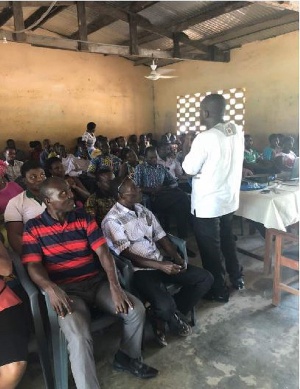 The ultimate aim of the workshop is to build good virtues in the teachers and children
The ultimate aim of the workshop is to build good virtues in the teachers and children
The Commission on Human Rights Administrative Justice (CHRAJ) is mandated under Article 218 (f) of the 1992 Constitution and Section 7 (1) (g) of its enabling Act, Act 456 of 1993, to educate the public on its core mandate areas namely Human Rights, Administrative Justice and Anti-Corruption.
In furtherance of this mandate, the Weija/Gbawe Municipal Office of the Commission on Human Rights and Administrative Justice (CHRAJ) conducted workshop for all the Basic School teachers in all Weija/Gbawe and Ga South Circuits, which includes, Obom, Ashalaja, Domeabra, Kwaku Panfo, Gbawe, Weija, Kofi Kwei, Bortianor, Ngleshie Amanfrom etc. The Theme for the workshop is "The Role of Teachers in the achievement of NACAP in the next ten years.
This is in recognition of the important role teachers play in achieving fundamental human rights and freedoms of the citizens.
Mr. Frank Kwabena Owusu, the Municipal Director of the Weija/Gbawe Municipal Office of the Commission who doubles as the resource person, during one of his presentation indicated to the participants that, the National Anti-Corruption Action Plan ( NACAP) a policy document to fight corruption for the next ten years, drafted by stakeholders which Ghana Education Service was part agreed to develop Co-curriculum courses on human rights and Corruption related activities as well as established human rights and integrity clubs in all the 1st and 2nd cycle institutions, Colleges,Universities etc.
Mr. Frank Kwabena Owusu further stated that, to achieve the NACAP policy document objective, teachers are being trained to inculcate in the school children the culture of human rights and to serve as catalyst in the fight against corruption in schools and communities.
According to him, NACAP integrated anti-corruption measures into the program and activities of public sector organizations, particularly MDAs and MMDAs and key actors in private sector.
He posited that NACAP enables collective action and sustained coordination of efforts as well as judicious application of resources of stakeholders to combat corruption and constitute the benchmark to assess the performance of stakeholders especially government, in the fight against corruption.
In concluding, he enumerated that NACAP, adopts a long term strategy perspective and utilizes a three prong approach to the fight against corruption, namely prevention, education, investigation and enforcement.
The ultimate aim of the workshop is to build good virtues and the spirit of patriotism in the teachers and children.